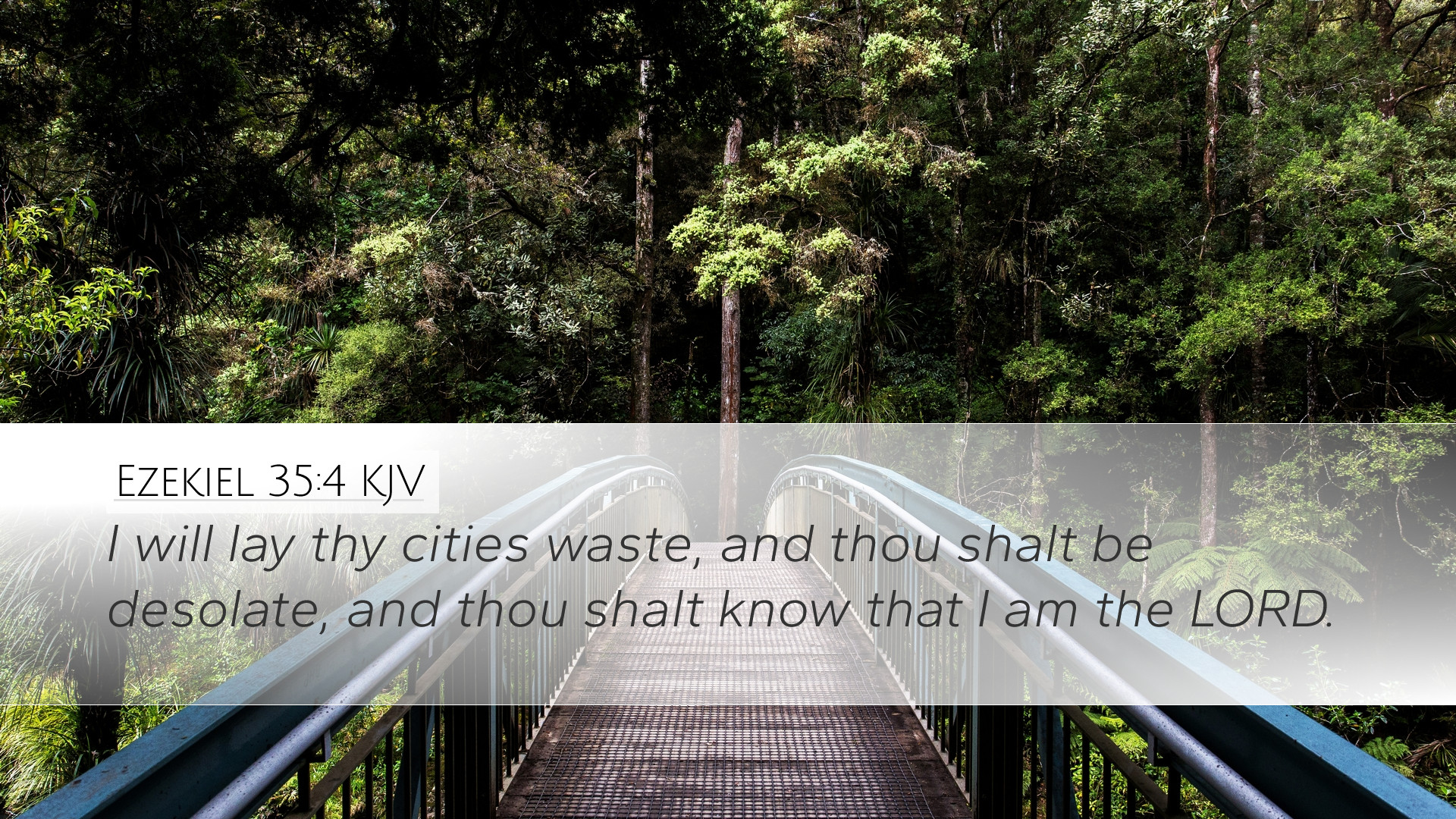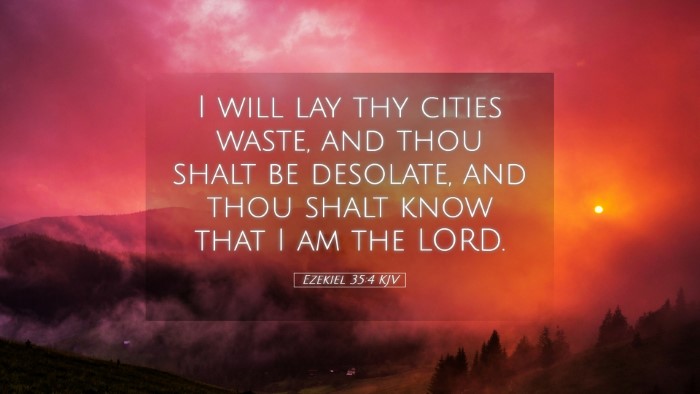Bible Commentary on Ezekiel 35:4
Ezekiel 35:4: "I will lay thy cities waste, and thou shalt be desolate, and thou shalt know that I am the LORD."
Introduction
This verse is a part of the prophecy pronounced against Mount Seir, a region that symbolizes the enemies of Israel. The prophetic judgment speaks not only to the geographical location but also to the spiritual condition and the actions that provoke divine wrath. The insights from renowned public domain commentators enhance our understanding of this complex passage.
Exegesis of the Verse
Ezekiel 35:4 articulates a clear theme: the desolation of cities represents the judgment of God on those who oppose His people. As we dissect this passage, we find multifaceted layers that speak of God's sovereignty, justice, and the ultimate deliverance of Israel.
Matthew Henry's Commentary
Judgment Against Enemies: Henry emphasizes how the desolation of Seir signifies God's judgment upon those who seek the harm of His chosen people. He reflects on the nature of divine retribution, which is not arbitrary but stems from a divine moral order that responds to human actions.
The Significance of Waste: According to Henry, when God states, "I will lay thy cities waste," it indicates a total annihilation of opposition. This serves as a sobering reminder of the fate that awaits those who defy God's plans and purposes.
Albert Barnes' Commentary
Divine Authority and Assurance: Barnes underscores the assurance that accompanies God's declarations. The phrase "thou shalt know that I am the LORD" is significant. It indicates that through experiencing His wrath, the nations would come to recognize the power and authority of the God of Israel.
Emphasis on Desolation: Barnes also points out that the intensity of desolation signifies not just physical but spiritual emptiness. When cities lie waste, it illustrates the abandonment of communities that turned away from God's ways and purposes.
Adam Clarke's Commentary
Symbolism of Mount Seir: Clarke expounds on the geographic and symbolic nature of Mount Seir, representing opposition to God’s covenant people. His interpretation highlights how God's promise to bring desolation serves both as punishment for injustice and a forewarning for others.
Spiritual Implications: According to Clarke, the desolation of Seir reflects a broader spiritual truth: that opposition to God’s covenant entails grave consequences. His commentary serves as a warning to contemporary socio-political entities about the importance of aligning with God’s purposes.
Theological Implications
The implications of Ezekiel 35:4 extend beyond mere historical judgment; they invite serious contemplation about the character of God and His relationship with humanity. The themes present here challenge readers and scholars alike to consider the nature of divine judgment and mercy.
God’s Sovereignty
This verse reaffirms God’s sovereignty over nations and individuals. The devastating prophecy against Seir illustrates that no power can stand against the will of the Almighty. Echoing through both historical accounts and theological discourse, it provides a lens through which to view God’s governance over the world.
Justice and Righteousness
Ezekiel 35:4 reinforces that God is just and will bring to account those who perpetuate violence and enmity against His people. This serves as a foundation for understanding God’s moral order—the righteous will ultimately be vindicated, while the wicked will face judgment.
Practical Applications
For pastors, students, theologians, and Bible scholars, this verse carries significant practical implications:
- Church and Community Integrity: The desolation of Seir can urge modern congregations to reflect on how communal actions align with God. Are they building up or tearing down?
- Awareness of Spiritual Warfare: Understanding the broader spiritual implications encourages believers to be vigilant against opposition to God’s kingdom.
- Hope and Assurance: For believers, this passage serves as a reminder of God's ultimate authority, instilling hope in God’s faithful justice and sovereignty.
Conclusion
Ezekiel 35:4 calls us to recognize the repercussions of opposing God’s purposes. Drawing from the works of Matthew Henry, Albert Barnes, and Adam Clarke, we see a rich tapestry of divine justice, the assurance of God’s authority, and the inevitable desolation faced by those who stand against His plan. This passage is not merely a historical artifact; it remains profoundly relevant to our understanding of God’s character and our calling as His people today.


